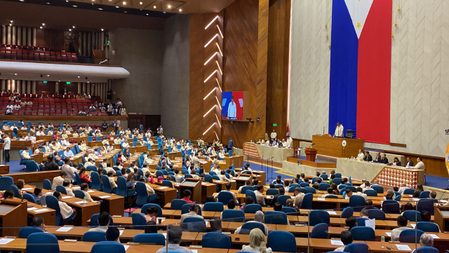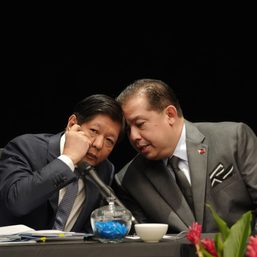SUMMARY
This is AI generated summarization, which may have errors. For context, always refer to the full article.
![[Vantage Point] The political ballroom beckons: Will you dance the Cha-Cha?](https://www.rappler.com/tachyon/2024/01/cha-cha-january-10-2024.jpg)
On Monday, January 8, Senator Jinggoy Ejercito Estrada fumed as he labeled as “unethical” and “illegal” reports that local chief executives had been asked to give P100 to every constituent who would agree to sign a petition to amend a constitutional provision which would allow Congress to vote separately when amending the Constitution.
It was Albay 1st District Representative Edcel Lagman who divulged that mayors from his province had been mustered into a meeting on January 5. In that meeting, mayors were supposedly coached on how to get their constituents agree to the plan. “It is unethical and illegal to solicit signatures of constituents to petition for charter change moves in exchange for P100, in the guise of supposed people’s initiative,” Estrada stressed, saying that the people’s initiative is a constitutional right that should be exercised freely and without coercion.
Talks of constitutional amendments creep up again despite being vehemently opposed by the people during past administrations.
The idea of revising the 1987 Constitution started soon after the late former president Corazon Sumulong Cojuangco-Aquino stepped down from office. The administration of her anointed heir who narrowly won the 1992 presidency, the late former president Fidel V. Ramos, lost no time in promoting constitutional amendments, including a shift to parliamentary system.
But what made charter change (Cha-Cha) stick like a sore thumb among the freshly liberated Filipinos then was the proposal to lift the term limits of public officials. Ay …as Hamlet said in his soliloquy, there’s the rub.
Ramos argued that changes were necessary – that such changes would bring more accountability, continuity, and responsibility to the “gridlock”-prone Philippine version of a presidential bicameral system. The move was thwarted by religious groups, opposition politicians, business tycoons, and left-wing organizations.
The process that would have led to a national referendum was defeated from the get-go. Oppositionists pointed out that the proposed constitutional changes would only benefit the incumbent, Ramos. The final nail on the coffin was a show of force on September 21, 1997: Half a million people attended a Church-organized rally in Rizal Park on what could be described as a stunning rebuke of the Ramos administration.
Finally on September 23, 1997, the Supreme Court, under Chief Justice Andres Narvasa, threw out a petition filed by the People’s Initiative for Reform, Modernization and Action (PIRMA) which sought to amend the Constitution through a signature campaign or People’s Initiative. The Supreme Court dismissed the petition on the grounds that the People’s Initiative mode does not have enough enabling law for the proposed revisions or amendments to the 1987 Constitution. Had the petition been successful, a national plebiscite would have been held for proposed changes.
Should we dance the Cha Cha?
The administrations of Joseph Estrada, Gloria Macapagal Arroyo, Benigno “Noynoy” Aquino III, Rodrigo Duterte, and now Ferdinand “Bongbong” Marcos Jr. have made multiple attempts to change the 1987 Constitution – either calling for a shift to a unicameral parliamentary form of government, economic liberalization, further decentralization of national government. or more empowerment of local governments through a transition to a parliamentary-federal government system – have all been met with a strong pushback from the public.
Based on diverse arguments, politicians, religious sects, and left-wing organizations argue that the proposed constitutional changes would be self-serving. The government, regardless of who was sitting at Malacañang Palace, has been accused of pushing constitutional reform for its own vested interests.
As a nation with a diverse cultural tapestry, we find ourselves at a crossroads where the question of constitutional amendments looms large. The call for constitutional change has been a recurring theme in Philippine politics, and as we grapple with evolving challenges and aspirations, the debate on whether to amend the Constitution gains renewed significance.
The 1987 Constitution, born out of the desire to move beyond the tumultuous years of the Marcos Sr. Martial Law, has been a stabilizing force in Philippine governance for more than three decades. It enshrines principles of democracy, human rights, and the rule of law. However, the landscape has changed since then. I would argue that the Constitution needs to evolve to address contemporary issues more effectively.
One of the primary arguments in favor of constitutional amendments revolves around economic development. I believe that certain restrictive economic provisions in the 1987 Constitution hinder foreign direct investment and limit the country’s economic potential. By loosening these restrictions, the Philippines can attract more investments, stimulate growth, and create job opportunities.
According to the Foundation for Economic Freedom, which I fully support, the restrictions in the 1987 Constitution serve as constraints to developing areas of the economy where the Philippines has great promise, such as mass media and renewable energy.
The existing economic constitutional restrictions limit investments that we need to develop our creative industries. Likewise, while investments in solar and wind energy have been liberalized, there is still a lot of uncertainty for foreign investors because of the 60/40 rule in investments in natural resources and land ownership. These are just some instances that make it difficult to make changes in policy, as economic conditions change, because of the restrictions embedded in the Constitution.
But I should caution against hasty constitutional changes, emphasizing the need to preserve the essence of the 1987 Constitution. Altering the fundamental law of the land should be approached with caution, as it is not merely a legal document, but a reflection of our nation’s values and identity. From my vantage point, amendments should prioritize inclusivity, social justice, and protection of individual rights.
Amending the Constitution is a complex undertaking that requires careful consideration of various factors. Whether through a constitutional convention, constituent assembly, people’s initiative, a hybrid approach, or targeted amendments, the key is in striking a balance between efficiency and inclusivity. As the nation contemplates these avenues for reform, fostering public participation, transparency, and education will be paramount to ensure that any changes reflect the true aspirations of the Filipino people.
Constitutional amendments are not merely legal modifications; they are the blueprint for a nation’s future. As such, the process demands the utmost diligence and respect for the democratic ideals that underpin Philippine society.
Whatever constitutional amendments are made, I believe that they should be limited to economic provisions. With this focused approach, the risk of political controversy and division will be reduced, ensuring the swift passage of crucial amendments to the economic provisions of the Constitution. The move toward greater economic freedom will empower our people to independently navigate their paths forward, benefiting not themselves and their families, but their communities and the nation as a whole.
Ultimately, the decision to amend the Constitution rests on the shoulders of the Filipino people. Public engagement and discourse on this matter are crucial. An informed and inclusive debate should guide the nation in determining whether constitutional amendments are legally sound and necessary. For as long as it does not involve giving more power to sitting politicians, I am all for it.
Striking the right balance between preserving the foundational principles of the 1987 Constitution and adapting to the evolving needs of society is a delicate task. It is essential that the process remains transparent, inclusive, and guided by the collective wisdom of the Filipino people to ensure a constitutional framework that will truly serve the nation in the years and generations to come. – Rappler.com
Val A. Villanueva is a veteran business journalist. He was a former business editor of the Philippine Star and the Gokongwei-owned Manila Times. For comments, suggestions email him at mvala.v@gmail.com.
1 comment
How does this make you feel?






The recent Cha-Cha dance is more likely choreographed by the Marcos-Romualdez Political Dynasty. The publicly stated purpose is, of course, for the welfare of the Filipino People. But hidden in the dance steps are the vested interests of the choreographer. Will the “right balance” (as stated by writer VA Villanueva) be achieved? Will the process be “transparent, inclusive, and guided by the collective wisdom of the Filipino people”? Or will it be guided by the vested interests of the choreographer?